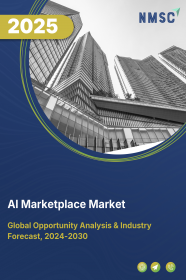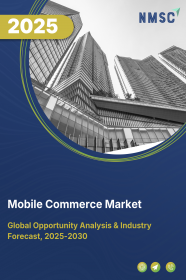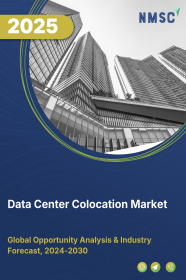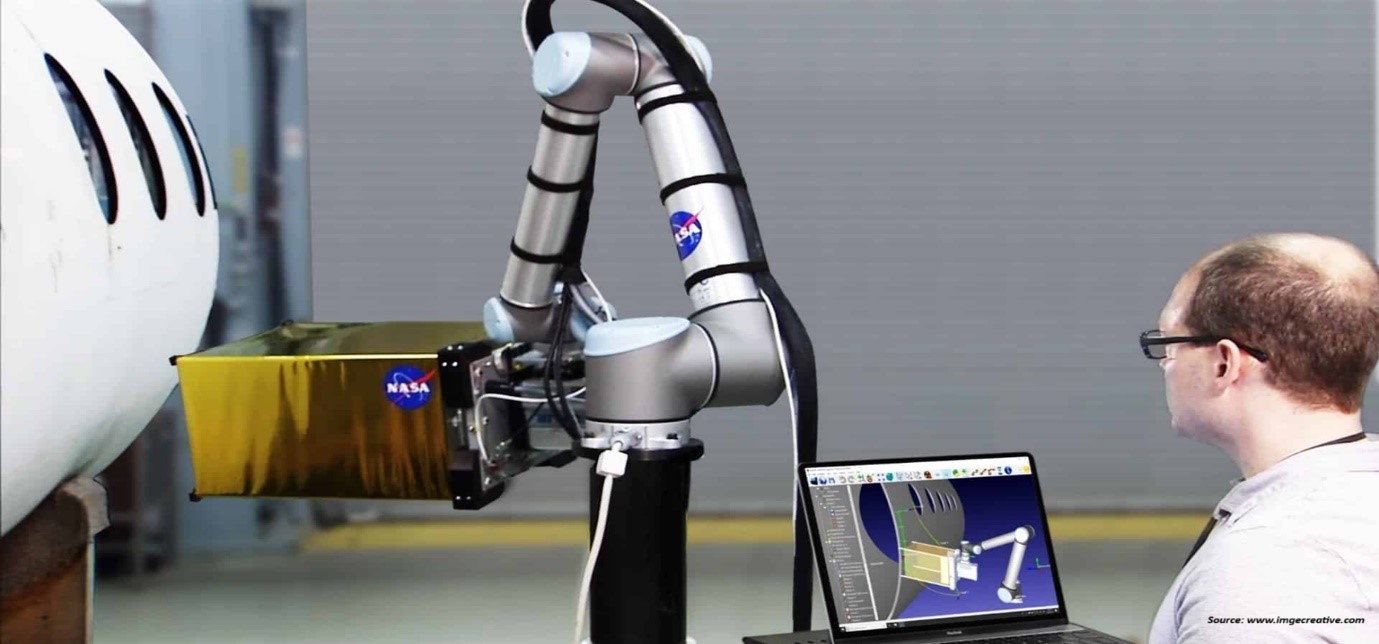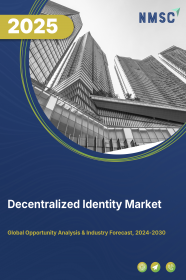
Decentralized Identity Market by Type (Biometric and Non-biometric), by Enterprise Size (Large Enterprises and Small & Medium Enterprises), and by Industry Vertical (BFSI, Government, Healthcare & Life Sciences, Retail& E-commerce, Telecom & IT, Transport & Logistics, Real Estate, Media & Entertainment, Travel & Hospitality, and Others)- Global Opportunity Analysis and Industry Forecast 2025-2030
US Tariff Impact on Decentralized Identity Market
Trump Tariffs Are Reshaping Global Business
Decentralized Identity Market Overview
The global Decentralized Identity Market size was valued at USD 1.52 billion in 2024 and is predicted to reach USD 56.83 billion by 2030 with a CAGR of 82.9% from 2025-2030.
Decentralized identity refers to the industry that uses distributed ledger or blockchain technology to retain and handle identity data without depending on a centralized entity.
Companies are implementing decentralized identity solutions to improve security, privacy and user authority over personal information. This sector includes platforms, protocols and services that enable identity ecosystems. The goal is to offer reliable, compatible identity solutions that enable companies to optimize workflows, boost compliance and elevate user experiences in a digitally interconnected environment.
Market Dynamics and Trends
The increasing number of fraud identification cases throughout the world is driving the decentralized identity market growth. As an example, there was a loss of more than USD 5.8 billion to fraud in 2021 worldwide reported by Federal Trade Commission. Thus, decentralized identification is acknowledged as one of the most secure identity systems capable of decreasing identity fraud, and it is widely used to identify fraud.
Moreover, the rapidly rising digitalization with the integration of cloud deployment in several industries such as BFSI, healthcare and e-commerce help to store data in a secure, decentralized manner, making them less vulnerable to hacks and data breaches is fueling the growth of the decentralized identity market demand.
Furthermore, the rising emphasis of regulatory compliance with stringent data protection laws by associations such as California Consumer Privacy Act and General Data Protection Regulation is pushing companies to adopt blockchain identity management. These regulations put strict controls over personal data handling that further helps companies to ensure user privacy and data security.
However, the development, deployment, and maintenance of decentralized identity system required high investment, creating a barrier for small and medium size organization, thus retraining the market growth.
On the contrary, the implementation of machine learning and artificial intelligence technologies in decentralized system solutions to identify trends or patterns useful for various applications is expected to create ample growth opportunities for the market in the future.
Market Segmentation and Scope of Study
The global decentralized identity market report is segmented on the basis of type, enterprise size, industry vertical, end-user and region. Based on type, the market is classified into biometric and non-biometric. Based on the enterprise size, the market is segmented into large enterprises and small & medium enterprises.
On the basis of industry vertical, the market is categorized into BFSI, government, healthcare & life sciences, retail & E-commerce, telecom & IT, transport & logistics, real estate, media & entertainment, travel & hospitality and others. Geographical breakdown and analysis of each of the aforesaid classifications include regions comprising of North America, Europe, Asia-Pacific, and RoW.
Geographical Analysis
North America dominates the decentralized identity market share, this is mostly due to the result of increased cyberattacks in countries such as the United States and Canada. As an example, as per the report of the Federal Trade Commission US customers lost $ 5.8 billion to fraud in 2021, a more than 70% rise from 2020. There is an enormous need for decentralized identity products, which coincides with an increase in cyber risks and fraudulent activity.
Furthermore, the presence of prominent market players such as Microsoft Corporation, R3, 1Kosmos Inc, and Civic Technologies, Inc. is driving the decentralized identity market expansion in this area through a variety of methods, including product launches. For example, in June 2022, Microsoft developed Microsoft Entra to enable clients with safe access in a connected world. It attempts to integrate identity and access management across several cloud environments by merging decentralized identity and digital interaction verification capabilities.
The Asia-Pacific region sees big growth in decentralized identity as its countries go more digital. The GSMA says mobile data use could go up four times by 2024. This is because more people have smartphones and can get fast internet for less money. As more deals happen online, companies need to use complex systems to check who people are. These systems must handle lots of transactions and to protect customers and businesses.
Also, e-commerce in this area is growing fast and creating tons of data. This helps the market grow even more. For example, Southeast Asian e-commerce will grow four times bigger at a rate of 22% each year as per the McKinsey and Company. They expect it to be worth about USD 230 billion between 2024 and 2026. With all these online deals, there's a big need to check people's identities well. This helps stop fraud and keep information private.
Competitive Landscape
The decentralized identity industry includes several market players such as Microsoft Corporation, Accenture plc, Wipro Limited, SecureKey Technologies Inc., Persistent Systems Limited, Avast Software s.r.o., Civic Technologies, Inc., R3, 1Kosmos Inc., Nuggets, IBM Corporation, Polygon Labs UI (Cayman) Ltd., Worldcoin, Lifeform, and SPACE ID. These market players are adopting various strategies such as acquisition and collaboration to maintain their dominance in the global market.
For instance, in March 2022, Avast acquired SecureKey to gain access to the company's decentralized identity expertise and big client base. This acquisition will allow Avast to extend their decentralized identification business globally.
Also, in September 2021, Civic Technologies collaborated with Solrise Finance to launch a decentralized investment platform. Through this collaboration, the companies aim to facilitate lightning-fast trades, pooled liquidity, and additional features for earning income.
Moreover, in February 2021, Accenture collaborated with Nuggets to help them improve and build their decentralized identity technology and business models. Accenture offered strategic consultancy and technical expertise to Nuggets as they developed their decentralized identification platform and commercial strategy.
Key Benefits
-
The report provides quantitative analysis and estimations of the decentralized identity market from 2025 to 2030, which assists in identifying the prevailing market opportunities.
-
The study comprises a deep-dive analysis of the current and future decentralized identity market trends to depict prevalent investment pockets in the market.
-
Information related to key drivers, restraints, and opportunities and their impact on the market is provided in the report.
-
Competitive analysis of the players, along with their market share is provided in the report.
-
Value chain analysis in the market study provides a clear picture of roles of stakeholders.
Decentralized Identity Market Key Segments
By Type
-
Biometric
-
Non-biometric
By Enterprise Size
-
Large Enterprises
-
Small & Medium Enterprises
By Industry Vertical
-
BFSI
-
Government
-
Healthcare & Life Sciences
-
Retail& E-commerce
-
Telecom & IT
-
Transport & Logistics
-
Real Estate
-
Media & Entertainment
-
Travel & Hospitality
-
Others
By Region
-
North America
-
The U.S.
-
Canada
-
Mexico
-
-
Europe
-
The UK
-
Germany
-
France
-
Italy
-
Spain
-
Denmark
-
Netherlands
-
Finland
-
Sweden
-
Norway
-
Russia
-
Rest of Europe
-
-
Asia-Pacific
-
China
-
Japan
-
India
-
South Korea
-
Australia
-
Indonesia
-
Singapore
-
Taiwan
-
Thailand
-
Rest of Asia-Pacific
-
-
RoW
-
Latin America
-
Middle East
-
Africa
-
Key Players
-
Microsoft Corporation
-
Accenture plc
-
Wipro Limited
-
SecureKey Technologies Inc.
-
Persistent Systems Limited
-
Avast Software s.r.o.
-
Civic Technologies, Inc.
-
R3
-
1Kosmos Inc.
-
Nuggets
-
IBM Corporation
-
Polygon Labs UI (Cayman) Ltd.
-
Worldcoin
-
Lifeform
-
SPACE ID
REPORT SCOPE AND SEGMENTATION:
|
Parameters |
Details |
|
Market Size in 2024 |
USD 1.52 Billion |
|
Revenue Forecast in 2030 |
USD 56.83 Billion |
|
Growth Rate |
82.9% from 2025 to 2030 |
|
Analysis Period |
2024–2030 |
|
Base Year Considered |
2024 |
|
Forecast Period |
2025–2030 |
|
Market Size Estimation |
Billion (USD) |
|
Growth Factors |
|
|
Countries Covered |
28 |
|
Companies Profiled |
15 |
|
Market Share |
Available for 10 companies |
|
Customization Scope |
Free customization (equivalent to up to 80 working hours of analysts) after purchase. Addition or alteration to country, regional, and segment scope. |
|
Pricing and Purchase Options |
Avail customized purchase options to meet your exact research needs. |

















 Speak to Our Analyst
Speak to Our Analyst



